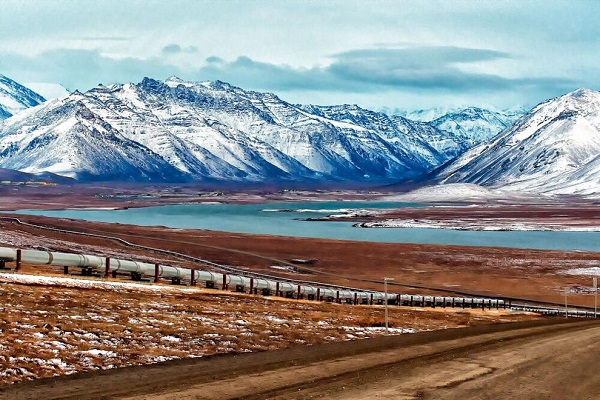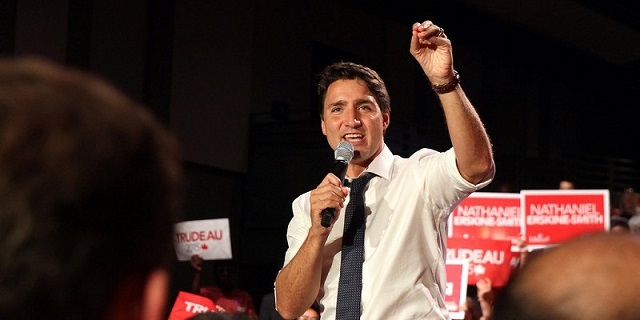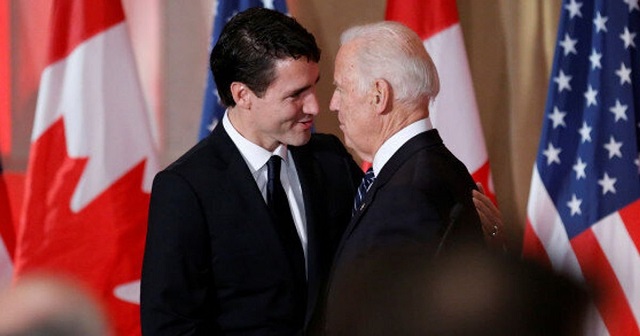Energy
Canada could have been an energy superpower. Instead we became a bystander

This article was originally published in a collected volume, Canada’s Governance Crisis, which outlines Canada’s policy paralysis across a wide range of government priorities. Read the full paper here.
From the MacDonald-Laurier Institute
By Heather Exner-Pirot
Government has imposed a series of regulatory burdens on the energy industry, creating confusion, inefficiency, and expense
Oil arguably remains the most important commodity in the world today. It paved the way for the industrialization and globalization trends of the post-World War II era, a period that saw the fastest human population growth and largest reduction in extreme poverty ever. Its energy density, transportability, storability, and availability have made oil the world’s greatest source of energy, used in every corner of the globe.
There are geopolitical implications inherent in a commodity of such significance and volume. The contemporary histories of Russia, Iran, Venezuela, Saudi Arabia, and Iraq are intertwined with their roles as major oil producers, roles that they have used to advance their (often illiberal) interests on the world stage. It is fair to ask why Canada has never seen fit to advance its own values and interests through its vast energy reserves. It is easy to conclude that its reluctance to do so has been a major policy failure.
Canada has been blessed with the world’s third largest reserves of oil, the vast majority of which are in the oil sands of northern Alberta, although there is ample conventional oil across Western Canada and offshore Newfoundland and Labrador as well. The oil sands contain 1.8 trillion barrels of oil, of which just under 10 percent, or 165 billion barrels, are technically and economically recoverable with today’s technology. Canada currently extracts over 1 billion barrels of that oil each year.
The technology necessary to turn the oil sands into bitumen that could then be exported profitably really took off in the early 2000s. Buoyed by optimism of its potential, then Prime Minister Stephen Harper pronounced in July 2006 that Canada would soon be an “energy superproducer.” A surge of investment came to the oil sands during the commodity supercycle of 2000-2014, which saw oil peak at a price of $147/barrel in 2008. For a few good years, average oil prices sat just below $100 a barrel. Alberta was booming until it crashed.
Two things happened that made Harper’s prediction fall apart. The first was the shale revolution – the combination of hydraulic fracturing and horizontal drilling that made oil from the vast shale reserves in the United States economical to recover. Until then, the US had been the world’s biggest energy importer. In 2008 it was producing just 5 million barrels of crude oil a day, and had to import 10 million barrels a day to meet its ravenous need. Shale changed that, and the US is now the world’s biggest oil producer, expecting to hit a production level of 12.4 million barrels a day in 2023.
For producers extracting oil from the oil sands, the shale revolution was a terrible outcome. Just as new major oil sands projects were coming online and were producing a couple of million barrels a day, our only oil customer was becoming energy self-sufficient.
Because the United States was such a reliable and thirsty oil consumer, it never made sense for Canada to export its oil to any other nation, and the country never built the pipeline or export terminal infrastructure to do so. Our southern neighbour wanted all we produced. But the cheap shale oil that flooded North America in the 2010s made that dependence a huge mistake as other markets would have proven to be more profitable.
If shale oil took a hatchet to the Canadian oil industry, the election of the Liberals in 2015 brought on its death by a thousand cuts. For the last eight years, federal policies have incrementally and cumulatively damaged the domestic oil and gas sector. With the benefit of hindsight in 2023, it is obvious that this has had major consequences for global energy security, as well as opportunity costs for Canadian foreign policy.
Once the shale revolution began in earnest, the urgency in the sector to be able to export oil to any other market than the United States led to proposals for the Northern Gateway, Energy East, and TMX pipelines. Opposition from Quebec and BC killed Energy East and Northern Gateway, respectively. The saga of TMX may finally end this year, as it is expected to go into service in late 2023, billions of dollars over cost and years overdue thanks to regulatory and jurisdictional hurdles.
Because Canada has been stuck selling all of its oil to the United States, it does so at a huge discount, known as a differential. That discount hit a staggering US$46 per barrel difference in October 2018, when WTI (West Texas Intermediate) oil was selling for $57 a barrel, but we could only get $11 for WCS (Western Canada Select). The lack of pipelines and the resulting differential created losses to the Canadian economy of $117 billion between 2011 and 2018, according to Frank McKenna, former Liberal New Brunswick Premier and Ambassador to the United States, and now Deputy Chairman of TD Bank.
The story is not dissimilar with liquefied natural gas (LNG). While both the United States and Canada had virtually no LNG export capacity in 2015, the United States has since grown to be the world’s biggest LNG exporter, helping Europe divest itself of its reliance on Russian gas and making tens of billions of dollars in the process. Canada still exports none, with regulatory uncertainty and slow timelines killing investor interest. In fact, the United States imports Canadian natural gas – which it buys for the lowest prices in the world due to that differential problem – and then resells it to our allies for a premium.
Canada’s inability to build pipelines and export capacity is a major problem on its own. But the federal government has also imposed a series of regulatory burdens and hurdles on the industry, one on top of the other, creating confusion, inefficiency, and expense. It has become known in Alberta as a “stacked pancake” approach.
The first major burden was Bill C-48, the tanker moratorium. In case anyone considered reviving the Northern Gateway project, the Liberal government banned oil tankers from loading anywhere between the northernmost point of Vancouver Island to the BC-Alaska border. That left a pathway only for TMX, which goes through Vancouver, amidst fierce local opposition. I have explained it to my American colleagues this way: imagine if Texas was landlocked, and all its oil exports had to go west through California, but the federal government banned oil tankers from loading anywhere on the Californian coast except through ports in San Francisco. That is what C-48 did in Canada.
Added to Bill C-48 was Bill C-69, known colloquially as the “no new pipelines” bill and now passed as the Impact Assessment Act, which has successfully deterred investment in the sector. It imposes new and often opaque regulatory requirements, such as having to conduct a gender-based analysis before proceeding with new projects to determine how different genders will experience them: “a way of thinking, as opposed to a unique set of prescribed methods,” according to the federal government. It also provides for a veto from the Environment and Climate Change Canada Minister – currently, Steven Guilbeault – on any new in situ oil sands projects or interprovincial or international pipelines, regardless of the regulatory agency’s recommendation.
The Alberta Court of Appeal has determined that the act is unconstitutional, and eight other provinces are joining in its challenge. But so far it is the law of the land, and investors are allergic to it.
Federal carbon pricing, and Alberta’s federally compatible alternative for large emitters, the TIER (Technology Innovation and Emissions Reduction) Regulation, was added next, though this regulation makes sense for advancing climate goals. It is the main driver for encouraging emission reductions, and includes charges for excess emissions as well as credits for achieving emissions below benchmark. It may be costly for producers, but from an economic perspective, of all the climate policies carbon pricing is the most efficient.
Industry has committed to their shareholders that they will reduce emissions; their social license and their investment attractiveness depends to some degree on it. The major oil sands companies have put forth a credible plan to achieve net zero emissions by 2050. One conventional operation in Alberta is already net zero thanks to its use of carbon capture technology. Having a predictable and recognized price on carbon is also providing incentives to a sophisticated carbon tech industry in Canada, which can make money by finding smart ways to sequester and use carbon.
In theory, carbon pricing should succeed in reducing emissions in the most efficient way possible. Yet the federal government keeps adding more policies on top of carbon pricing. The Canadian Clean Fuel Standard, introduced in 2022, mandates that fuel suppliers must lower the “lifecycle intensity” of their fuels, for example by blending them with biofuels, or investing in hydrogen, renewables, and carbon capture. This standard dictates particular policy solutions, causes the consumer price of fuels to increase, facilitates greater reliance on imports of biofuels, and conflicts with some provincial policies. It is also puts new demands on North American refinery capacity, which is already highly constrained.
The newest but perhaps most damaging proposal is for an emissions cap, which seeks to reduce emissions solely from the oil and gas sector by 42 percent by 2030. This target far exceeds what is possible with carbon capture in that time frame, and can only be achieved through a dramatic reduction in production. The emissions cap is an existential threat to Canada’s oil and gas industry, and it comes at a time when our allies are trying, and failing, to wean themselves off of Russian oil. The economic damage to the Canadian economy is hard to overestimate.
Oil demand is growing, and even in the most optimistic forecasts it will continue to grow for another decade before plateauing. Our European and Asian allies are already dangerously reliant on Russia and Middle Eastern states for their oil. American shale production is peaking, and will soon start to decline. Low investment levels in global oil exploration and production, due in part to ESG (environmental, social, and governance) and climate polices, are paving the way for shortages by mid-decade.
An energy crisis is looming. Canada is not too late to be the energy superproducer the democratic world needs in order to prosper and be secure. We need more critical minerals, hydrogen, hydro, and nuclear power. But it is essential that we export globally significant levels of oil and LNG as well, using carbon capture, utilization, and storage (CCUS) wherever possible.
Meeting this goal will require a very different approach than the one currently taken by the federal government: it must be an approach that encourages growth and exports even as emissions are reduced. What the government has done instead is deter investment, dampen competitiveness, and hand market share to Russia and OPEC.
Heather Exner-Pirot is Director of Energy, Natural Resources and Environment at the Macdonald-Laurier Institute.
Energy
Net Zero’s days are numbered? Why Europeans are souring on the climate agenda

From LifeSiteNews
By Frank Wright
Dr. Benny Peiser recently spoke about how the E.U. and various European nations have started a ‘rollback’ of their climate agendas due to ‘increasing costs and increasing hostility from the public.’
A recent presentation given in Canada brings welcome news to the reality-based community: Net Zero’s days are numbered. The costs of the “utopian” green agenda have been realized, and the public are not buying it any more.
This is the message of Dr. Benny Peiser of the Global Warming Policy Foundation, who was in Calgary on April 9 to speak about “Europe’s Net Zero rebellion and the implications for Canada.”
“The game is over for anyone who is willing to commit industrial suicide through the implementation of Net Zero policies,” he says, going on to cite public opinion and political decisions which are driving the political agenda of the future.
Peiser shows how the European Union and the nations of Sweden, France, Germany, Britain, and Italy have started this “rollback” – due to “increasing costs and increasing hostility from the public.”
Saying that Canada, where he spoke, is “maybe five years” behind the Net Zero rollback in Europe, he said the agenda was in retreat there as its “astronomical” costs have now been grasped by the public.
“This is direct,” he says.
We have been telling [the public] for 15 years this will be very expensive … and your energy bills are going up because of the renewables.
This is all far too abstract for people. They don’t get that.
Citing reports which show that Net Zero will cost over a trillion euros a year, every year, he says:
This they get directly – the car they can’t drive, the way they heat their homes. What they’re allowed to do.
That has caused huge opposition and a lot of headache for governments.
Peiser says political parties across Europe have realized that they face being swept from power in the forthcoming elections in June.
Politics pivots back to reality
The headaches Peiser cites include the near collapse of the German government late last year over a policy to make heat pumps compulsory. A week after Peiser’s talk, news came that the Scottish coalition government has collapsed, with the Greens withdrawing support from the ruling SNP after the abandonment of climate change targets.
Politicians are faced with a choice between electoral oblivion and public opinion, and Peiser says this has led to structural change in European policy.
Peiser believes that the enormous public support behind the farmer protests, coupled with green policies creating crisis in the German government, has made the E.U. think again.
“As a result of these protests governments and the European Commission itself have begun to cave in,” Peiser said. “They are not just losing farmers but a large chunk of the public at the same time.”
Peiser is aware that election cycles see politicians shelve unpopular policies – only to resume them after the votes have been counted. Yet he notes a structural change in priorities.
“The E.U. in its draft agenda for the next five years has decided to relegate climate and shift to defense,” he continued, saying that the European Union is shifting from the green agenda to the “real agenda.”
This pivot to reality is one that is long overdue. As Peiser points out, the case for Net Zero is one that is made out of words, not of facts. To take one example, that of electric vehicles, he says “the biggest fear in Europe is not climate change. The biggest fear is cheap electric vehicles from China.”
The E.U.’s recent Net Zero Industry Act (NZIA) has been shaded by economic and industrial concerns, as well as fear from the climate lobby that it too is a rollback of Net Zero commitments.
Passed on April 25, its name alone would suggest business as usual for the climate agenda.
However, in a press conference introducing the Act last November, German “conservative” MEP Christian Ehler was keen to anticipate criticism from the Green lobby, saying “this is not an attempt to scrap social achievements or environmental law.”
Ehler’s emphasis here was on industry and whether Europe will have an economic and industrial future – or not.
Ehler stressed the need to keep industry “on our side” and that the past practices of regulation threatens the economic future of European industry,
It’s simply reflecting the very fact that our industry is burdened by regulation in a way that we can’t expect them to succeed – if we really want to have them on our side – and if we really have to have an economic future for the European industry.
READ: New documentary exposes climate agenda as ‘scam’ to increase globalist power and profit
An act in name only
This may explain why, according to two experts, the Act is in fact just words. Yet it is not only the threat of Green-inspired regulation which faces European industry.
Chinese dominance of the market has rendered E.U. Net Zero measures to create a “sustainable” industry producing “green technology” such as solar panels mere “paper tigers,” according to one analyst.
Simone Tagliapietra, a senior fellow at think-tank Bruegel said this in response to the E.U.’s new Act.
His comments, reported by Euractiv on April 26, included an explanation why the legislation “doesn’t change anything.”
A second analyst, Nils Redeker of the Berlin-based Jacques Delors Centre, agreed according to Euractiv that the new measures “could, in practice, and will most likely, be ignored.”
The green lights are going out all over Europe, most obviously in what was once its industrial and economic powerhouse.
Germany in crisis
Following a budget crisis which also threatened the survival of the German government’s “Red/Green/Yellow” or “traffic light” coalition last November, the former E.U. paymaster of Germany was said to be “likely in recession.”
The February 19 report by the Daily Telegraph noted the resulting “uncertainty” over Net Zero implementation. This is another sign of the impact of reality on the deeply unpopular policies of what Peiser called the “utopia” imagined by the Green lobby.
The Daily Telegraph also reported that the German central bank had warned of “no end in sight” for the “ongoing weakness” of Europe’s largest economy.
The Bundesbank added that “uncertainty regarding climate and transformation policy remains elevated.”
In his analysis of the electoral cost of Net Zero, Peiser seems to have read the room very well. The political climate has changed.
As the British government is faced with power cuts over soaring demand for electricity, its refusal to build more gas-fired power stations may see the actual lights go out as well as the figurative beacon of an agenda the Conservative Party have greenlit for years.
U.K. climate chief quits
The outgoing head of the U.K.’s climate change committee has conceded that Net Zero is a toxic brand:
Net Zero has definitely become a slogan that I feel occasionally is now unhelpful, because it’s so associated with the campaigns against it.
Chris Stark, who looks exactly as you would imagine he would, blamed a minority faction of imaginary “culture warriors” whilst saying on April 22 in The Guardian that the cost of living was effectively irrelevant.
“It’s the culture warriors who have really taken against it,” said Stark. “A small group of politicians or political voices has moved in to say that net zero is something that you can’t afford, net zero is something that you should be afraid of … But we’ve still got to reduce emissions. In the end, that’s all that matters.”
Stark’s missionary zeal is untouched by a Europe-wide survey cited by in Peiser’s presentation. According to the survey, conducted in January by the European Council on Foreign Relations (ECFR), it is the climate zealots themselves who are the minority.
With a sample from 12 European nations, it shows a clear majority in 10 countries for “reducing energy bills” over “reducing carbon emissions.” In Germany, support for lower energy costs is more than twice that for the higher ones promised by “reducing emissions.”
Peiser explained, “What [the survey] tells you is that a clear minority of Europeans are prioritizing the climate issue over their energy cost issue.”
READ: Climate expert warns against extreme ‘weather porn’ from alarmists pushing ‘draconian’ policies
Describing the clear majority of European citizens against the cost of Net Zero, he says “that is the most dramatic change I’ve seen in the last 20 years.”
This “realization of cost moment” is one which Peiser shows had been predicted in the 1970s by Anthony Downs, whose “issue attention cycle” predicted public understanding of the true cost as the point beyond which climate policies will no longer enjoy public support.
The graph roughly charts the interest and support of the public, which moves from ignorance of the “problem” to generate public support through a sense of alarm. This enthusiasm steeply fades as the public realizes the price of the product they have been sold.
Yet this process is based on the common sense to the common man. The U.K.’s former climate change chief Christopher Stark is immune to this determining factor.
He displays the alarming detachment from reality which typifies the Net Zero zealot, and which Peiser warns is proving electorally – and industrially – suicidal.
Speaking of the implementation of Net Zero, Stark claimed, against rapid deindustrialization, soaring energy prices, and former measures to restrict cars and home heating to costly and inferior alternatives, that “the lifestyle change that goes with this is not enormous at all.”
This also ignores the likely “power cuts” that Britain will face, given a massive upsurge in Net Zero-driven electricity demand.
The Daily Telegraph, reporting accusations from the Green lobby that Rishi Sunak was “abandoning” Net Zero, said on March 17 that without more gas fired power generation, support for Net Zero “would collapse.”
The report continued that “the U.K. would almost certainly endure power cuts, causing civic and commercial havoc, without more gas-fired baseload in place.”
The piece concludes with a verdict which is now becoming a theme: “And then the case for tackling climate change, already increasingly questioned, would become politically toxic.”
The rule of law – or the rule of lawyers
As Peiser notes, this toxification has weakened the power of politics itself, with the rule of law being replaced by the rule of lawyers. He notes a recent ruling by the European Court of Human Rights, which condemned the Swiss government for “violations of the Convention [on Human Rights] for failing to implement sufficient measures to combat climate change.”
Peiser said the ruling showed that democratic majorities do not have the legal power to refuse an agenda enforced by activist judges. He went on:
The judges in their in their ruling said it’s kind of naive to think that democracy would work just with majorities in Parliament and that only judges can rule or decide what makes legal sense – that’s why it’s so important for judges to tell parliaments what they should do.
That’s essentially what they were saying today.
Peiser was speaking on the same day the ruling was announced, which according to a Swiss report will “have a direct impact on the Council of Europe’s 46 member states” and that “its ramifications will extend to the whole world.”
This element of legal insurrection is one direct example of how the sovereignty of democracy is being undermined. In this case, a group of elderly female climate campaigners received a sympathetic hearing from the ECHR’s presiding judge, Siofra O’Leary. Her judgment overruled the Swiss courts’ dismissal of the case. It read:
The Court found that the national courts had not provided convincing reasons as to why they had considered it unnecessary to examine the merits of the complaints. They had failed to take into consideration the compelling scientific evidence concerning climate change and had not taken the association’s complaints seriously.
As Peiser warns, we are ruled by Science Followers, whose emotional enthusiasm for the climate panic talks past the costs of the sale of this agenda. It is a product which most people now recognize promises the permanent collapse of living standards in the West, and is taking democracy down with cries for climate “justice.”
Suicidal policy vs. ‘populism’
Peiser says Net Zero is already “suicidal” – and not in name only. Changing the branding will not wash with voters, Peiser says, as the impact of cost and on freedom is “direct.”
This, he says, is what is driving the beginning of the end of Net Zero.
“Europeans have been told that this Net Zero issue and renewables and so on will make life easier for people.” Instead, he says, “the opposite has happened.”
They’ve been told that energy costs would go down. They’ve gone up.
He observes a factor which could apply to practically any of the policies he also claims are driving “populism.”
So people are beginning to realize that what they’ve been told hasn’t actually materialized.
The opposite has materialized.
Peiser himself notes that this “opposite effect” is driving the rise of “populist parties … skeptical of mass immigration, of Net Zero and of other mainstream policies.”
He says, “I don’t know exactly why they’re called populist but something makes them popular.”
Yet his own presentation shows a simple explanation. What is called “populism” is simply a reaction to the insanity of the policies of national suicide presented as wisdom. The emergence of these parties is the opposite reaction to a political system whose every argument is a contradiction of reality.
Peiser says that this political correction is coming, and soon.
The mainstream parties are concerned that they will hemorrhaging voters.
That’s what the prospects are for the elections in June.
His assessment is shared by the European Council on Foreign Relations, which predicted a “sharp right turn” in the forthcoming E.U. Parliament elections.
He says that for Europe “there might be – for the first time – a center right populist majority in Parliament. If that were to happen of course all bets are off.”
What is more, Peiser concludes that political climate change is coming home – to yours:
That’s the situation in Europe which sooner or later will come to a theater close to you.
Energy
Houses passes bill to protect domestic oil production, protect Iñupiat community

From T
Indigenous communities are advocating for economic development projects in the North Slope, explaining that more than 95% of their tax base comes from resource development infrastructure.
The U.S. House passed another a bill to advance domestic energy production, this time in response to cries for help from an indigenous community living in the Alaska North Slope.
The bill’s cosponsor, a Democrat from Alaska, did not vote for her own bill. It passed with the support of five Democrats, including two from Texas who are strong supporters of the U.S. oil and natural gas industry.
The U.S. House has advanced several bills and resolutions to support domestic U.S. oil and natural gas production, supported by Texas Democrats. They’ve done so after the Biden administration has taken more than 200 actions against the industry, The Center Square reported.
One includes the Department of the Interior restricting development on over 50% of the Arctic National Wildlife Refuge (ANWR), directly impacting the Iñupiat North Slope community.
The Alaska North Slope region includes a part of ANWR and National Petroleum Reserve-Alaska (NPRA). Both are home to the indigenous Iñupiat community who maintain that the Biden administration is trying to “silence indigenous voices in the Arctic.”
The plan to halt North Slope production was done through a federal agency rule change, a tactic the administration has used to change federal law bypassing Congress. The rule cancels seven oil and gas leases issued by the Trump administration in the name of “climate change.” Interior Secretary Deb Haaland said canceling the leases was “based on the best available science and in recognition of the Indigenous Knowledge of the original stewards of this area, to safeguard our public lands for future generations.”
The indigenous community strongly disagrees, saying they weren’t consulted before, during or after the rule change.
Nagruk Harcharek, president of the Voice of Arctic Iñupiat, a nonprofit that represents a collective elected Iñupiaq leadership, says the administration’s mandate “to ‘protect’ 13 million acres of our ancestral homelands was made without fulfilling legal consultative obligations to our regional tribal governments, without engaging our communities about the decision’s impact, and with an incomplete economic analysis that undercuts North Slope communities.”
He argues the administration has overlooked “the legitimate concerns of elected Indigenous leaders from Alaska’s North Slope. This is a continuation of the onslaught of being blindsided by the federal government about unilateral decisions affecting our homelands.”
Restricting NPR-A oil production is “yet another blow to our right to self-determination in our ancestral homelands, which we have stewarded for over 10,000 years. Not a single organization or elected leader on the North Slope, which fully encompasses the NPR-A, supports this proposed rule,” he said, adding that they asked for it to be rescinded.
In response, U.S. Reps. Mary Sattler Peltola, D-Alaska, and Pete Stauber, R-Minn., introduced HR 6285, “Alaska’s Right to Produce Act.” The U.S. House Committee on Natural Resources Subcommittee on Energy and Natural Resources held a hearing on the issue; members of the Iñupiat Community of the Arctic Slope and the Kaktovik Iñupiat Corporation testified.
Kaktovik Iñupiat Corporation president Charles Lampe said they “refuse to become conservation refugees on our own homelands and unapologetically stand behind the Alaska’s Right to Produce Act.”
The Kaktovik is the only community located in the ANWR. The North Slope Iñupiat have stewarded their ancestral homelands for thousands of years, predating the creation of the U.S. federal government, the Interior Department and the state of Alaska, they argue.
The indigenous communities are advocating for economic development projects in the North Slope, explaining that more than 95% of their tax base comes from resource development infrastructure. Tax revenue funds public school education, health clinics, water and sewage systems, wildlife management and research and other services that otherwise would not exist, they argue. Eliminating their tax base, will directly impact their lives and jeopardize their long-term economic security, they argue.
The House passed Alaska’s Right to Produce Act on Wednesday to reverse the rule change and establish the Coastal Plain oil and gas leasing program. It authorizes and directs federal agencies to administer oil and natural gas leasing on 13 million acres of public land in the North Slope.
The bill passed by a vote of 214-199 without the support of its Democratic cosponsor from Alaska, Peltola, who voted “present.”
Five Democrats voted for it: Sanford D. Bishop, Jr. of Georgia, Henry Cuellar and Vincente Gonzalez of Texas, Jared Golden of Maine and Marie Gluesenkamp Perez of Washington. One Republican voted against it, Rep. Brian Fitzpatrick of Pennsylvania.
After it passed, Harcharek said, “Since the Biden administration announced this decision in September, our voices, which overwhelmingly reject the federal government’s decisions, have been consistently drowned out and ignored. This administration has not followed its well-documented promises to work with Indigenous people when crafting policies affecting their lands and people. We are grateful to Congress for exercising its legislative authority to correct the federal government’s hypocrisy and advance Iñupiaq self-determination in our ancestral homelands.”
Kaktovik Mayor Nathan Gordon, Jr. said the administration “is regulating our homelands in a region they do not understand and without listening to the people who live here.” The new law is “a vital corrective measure that will prevent our community from being isolated and protect our Iñupiaq culture in the long term.”
The bill heads to the Democratic controlled Senate, where it is unlikely to pass.
-

 Alberta2 days ago
Alberta2 days agoOfficial statement from Premier Danielle Smith and Energy Minister Brian Jean on the start-up of the Trans Mountain Pipeline
-

 Economy2 days ago
Economy2 days agoToday’s federal government—massive spending growth and epic betting
-

 Economy2 days ago
Economy2 days agoYoung Canadians are putting off having a family due to rising cost of living, survey finds
-

 Opinion11 hours ago
Opinion11 hours agoClimate Murder? Media Picks Up Novel Legal Theory Suggesting Big Oil Is Homicidal
-

 COVID-192 days ago
COVID-192 days agoCanada’s COVID vaccine injury program has paid out just 6% of claims so far
-

 Environment1 day ago
Environment1 day agoClimate Alarmists Want To Fight The Sun. What Could Possibly Go Wrong?
-

 Bruce Dowbiggin19 hours ago
Bruce Dowbiggin19 hours agoIt Gets Late Early These Days: Time To Bounce Biden & Trudeau?
-

 Addictions21 hours ago
Addictions21 hours agoCity of Toronto asks Trudeau gov’t to decriminalize hard drugs despite policy’s failure in BC







